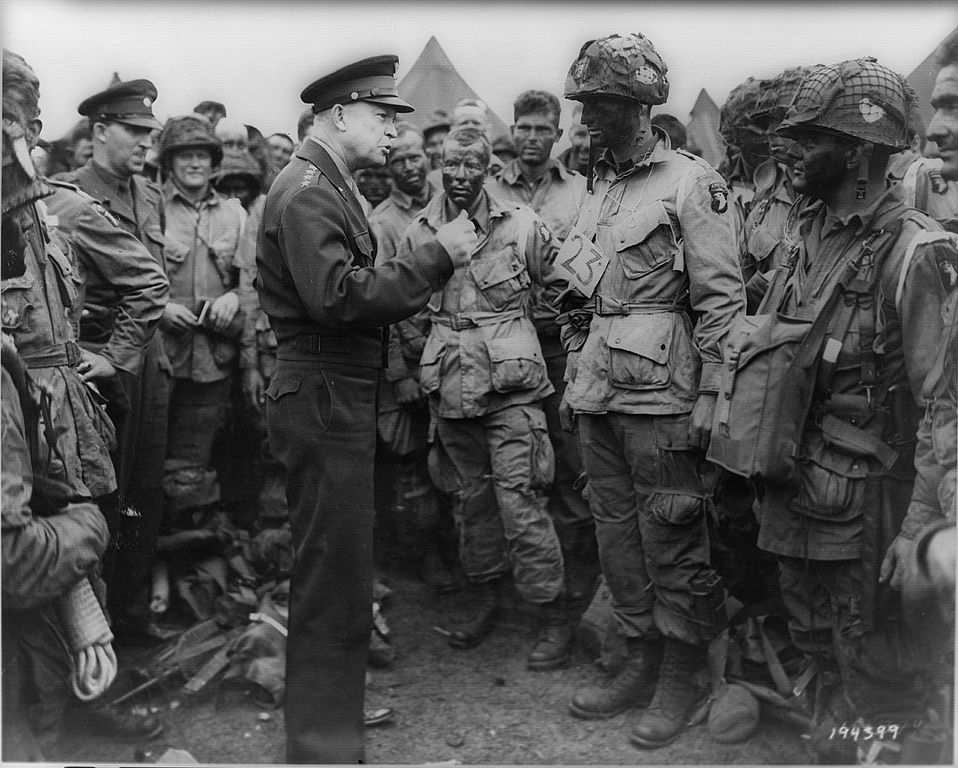He was an ambitious leader. Dedicated, bright respected – but his career was stalled in middle management.
During World War I, he watched as colleagues grabbed the coveted assignments. While other officers led troops in combat, he remained in the States to run a training camp. After the war, he was stuck at the rank of major for 16 years.
He didn’t become a full colonel until he was nearly 51.
Not cut out for an executive position?
Not quite, because over the next 12 years Dwight Eisenhower’s career took off. He moved from brigadier general to lieutenant general to Supreme Allied Commander in Europe to General of the Army to first Supreme Commander of NATO to President of the United States.
He won two presidential elections by wide margins. By the time of his death, he’d been named as Gallup’s most admired man a record 12 times.
Not bad for a leader who didn’t hit the fast track until his 50s.

What Made Eisenhower a Great Leader?
Eisenhower wasn’t a supremely eloquent, visionary leader like Roosevelt or a charismatic, culture changer like Kennedy. Nonetheless, “Ike” was the ideal president for post-war era, when people were enjoying themselves after two decades of depression and war while worried about Cold War nuclear tensions.
Ike provided safety and stability. His two chief goals were to contain the Soviets and maintain the booming economy. He nailed both.
In retrospect, Ike’s long years as a junior officer were not wasted. First, he learned to be a great follower. Then he learned to be great leader.
I see at least five lessons learned.
1. Ike Learned How to Be Himself
In his excellent book Ike: An American Hero, Michael Korda describes Ike’s authenticity.
Years of being passed over for promotion helped keep Ike humble. Later on, this became a powerful asset.
2. Ike Learned How to Lead Himself
Ike was authentic. But unlike some current presidential candidates, Ike didn’t give free rein to his emotions. As a leader, he was careful to project a positive attitude – even when he felt otherwise. In his book The Presidential Difference: Leadership Style from Roosevelt to Clinton, Fred Greenstein writes:
Realizing that the commander has the double burden of “preserving optimism in himself and in his command” and that “optimism and pessimism are infectious and they spread more rapidly from the head down than in any direction,” Eisenhower made the following resolution [prior to the invasion of North Africa during World War II]: “I firmly determined that my mannerisms and speech in public would always reflect the cheerful certainty of victory –that any pessimism and discouragement I might ever feel would be reserved for my pillow. To translate this conviction into tangible results, I adopted a policy of circulating through the whole force to the full limit imposed by physical considerations. I did my best to meet everyone from general to private with a smile, a pat on the back and a definite interest in his problems.”
Ike proved that you can be an authentic leader while exercising emotional self-control.
3. Ike Learned How to Be Accountable
Korda writes that Eisenhower “… believed strongly that a president should ‘take personal responsibility for mistakes and give subordinates credit for success.’”
This is exemplified in the speech General Eisenhower had prepared just in case D-Day was a failure. It may be the best speech an American leader never delivered:
Our landings in the Cherbourg-Havre area have failed to gain a satisfactory foothold and I have withdrawn the troops. My decision to attack at this time and place was based on the best information available. The troops, the air and the Navy did all that bravery and devotion to duty could do. If any blame or fault attaches to the attempt, it is mine alone.
Too many of today’s leaders refuse to take responsibility. Ike reminds us that the greatest leaders hold themselves accountable.
4. Ike Learned How to Get Along with Others
Ike may be unique among great military leaders in that he owed his success as much to his diplomatic skills as to his grasp of strategy. As the Supreme Allied Commander in Europe during World War II, he managed subordinates and allies with some big egos – George Patton, Winston Churchill, British Field Marshal Bernard Montgomery and French General Charles de Gaulle. He earned the respect and trust of the Soviets. He even managed to impress the notoriously paranoid Joseph Stalin.
5. Ike Learned to Tolerate Divergent Points of View
Ike was able to consider other points-of-view. Even though he strongly opposed Soviet expansionism, he could see the world from their perspective and worked hard to reduce tensions. A moderate Republican, he supported Social Security at a time when many conservatives were trying to roll it back. He supported civil rights. A career military man, he warned of the dangers of the military-industrial complex (and in fact coined the term).
A Leader We Can Learn From
“I Like Ike” was the slogan of Eisenhower’s successful 1952 and 1956 presidential campaigns.
It still rings true today.
Ike was an authentic, accountable leader who made people feel safe. He was a diplomat who could be tough on matters of principle and whose most important accomplishments took place after he was 50.
I just don’t like Ike. I want to be like Ike.
Leave a Reply